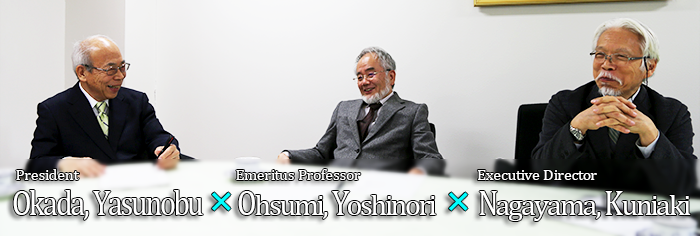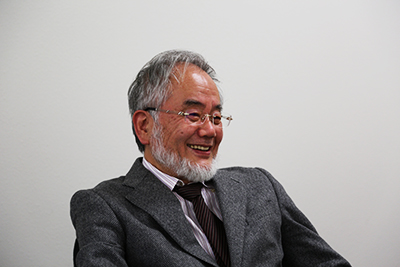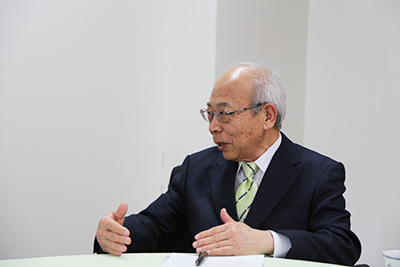[Interview] Professor, Professor Emeritus Ohsumi, Yoshinori No. 2


40 years with yeast, looking into microscopes day and night yields a discovery of the century.
Okada We now will go into autophagy (self-eating of cells). 10 years after you returned from the U.S. to the University of Tokyo, you became an associated professor at the age of 43, and you had your own research laboratory for the first time.
Ohsumi I was constantly studying yeast under Dr. Anraku, but after having my own laboratory, I thought about researching with a new theme.
In general, it seems that, if you try to continue a subject of research you were engaged in overseas, it would not work well in Japan. It may be that, the subject works in the particular research system there, and you cannot beat the original.
Nagayama I think the research direction you chose was also your big deal.
Ohsumi However, there was one thing I came up with in my experience in research activities in the U.S. I noticed by observation with an optical microscope that the organelles (subunits within cells) were enriched in the supernatant that was wasted after experimental work.
Then, I thought about what sort of decomposition function the vacuoles have in the cell and how to approach them in the molecular level, which was not yet clarified. As I always liked to look through the microscope, I aimed to discover the functions of vacuoles based on this theme, and repeated observations.
When do yeasts break up protein? Actually, the cell differentiation called 'sporulation' occurs in a starvation state that is nitrogen source, creating four daughter cells by meiotic division. In the starvation state, it needs to break up the protein needed for differentiation on its own. This nitrogen starvation is the keyword.
Then, as I received from the stock center the yeasts that lacked the proteolytic enzyme within their vacuoles, I added the vacuoles that were in the state of nitrogen starvation, I was able to discover that the cells started moving actively more than I expected. I was totally absorbed in this and kept looking with the microscope. This was the start of my research on autophagy. From this experience, I still try to convey the importance of observations by microscopes even today.
After that, also with the support of excellent observation skills of a female student from Saitama University, and with theories of genetics, I was able to produce research fruits and wrote a paper.
'Hetero' environment fosters human resources ? The environment where one can concentrate in his/her research without worries is crucial.
Okada Then, you went to a new post as a professor at the National Institute of Basic Biology in 1996. In 2004, you took up the post of professor in the Graduate Course of Life Science at our university, and have been producing many researchers for ten years. We thank you. How do you think about the graduate course education and researches of our university?
Ohsumi SOKENDAI students are gathered from various universities and it is said that the "hetero" environment that I always consider important, that is, the diversity of human resources with different backgrounds creates soil that brings new ideas in research activities. It is also important to study abroad as well as to be able to touch not only research activities but also life, culture and religion around the world.
For instance, if one laboratory has students, each of whom has high ability of science, of presentation, or of communications, the level of the laboratory as a whole will rise as a result of mutual friendship with each other. It is difficult for a group that has similar talents and ideas to produce such an effect.
Nagayama Recent laboratories have a tendency to become small as the specialization has become subdivided and the number of students is decreasing, and what you say is that it is a problem to be confined in one laboratory.
Okada The science and technology research budget has doubled from 1990 to 2000, but since national universities were incorporated in 2004, it decreased by 1% each year, decreasing by more than 12% in the past 12 years. As a result, the number of researchers whose research expenses are insufficient has dramatically increased. Even Inter-University Research Institutes Corporation are trying hard to secure research fund. It is a reality that researchers are forced to work hard to secure competitive research expenses such as Grants-in-aid for Scientific Research. Moreover, visible achievements are always demanded.
Research environment that allows researchers to concentrate is being lost, and if this goes on, we may have a situation that young people would hesitate to be researchers. Then, the academic level of Japan will decline and it would give a negative impact to this country. In the near future, we may end up having no more Nobel laureates.
Ohsumi There is a system that provides a small support to young researchers in research funding, but in the current situation where assistants and others have a term of office, they cannot go study abroad with confident.
Okada Among 17,000 young faculty members of national universities, 4,000 of them have been changed to the positions other than permanent in the last ten years. I think this is a critical situation.
It is important also to develop a donation culture, and to foster research collaborations between companies and universities aiming for basic knowledge exploration.
Ohsumi It may not be limited to research activities, and it is also true that some sense of blockage has emerged throughout Japan. I think we must circumvent this sense of stagnation somehow. I think that it would be good if the donation activity would be more active in order to make a contribution to free and vibrant research activities. Among affluent people in Japan, there is a momentum of willingness to make donations if they are used effectively for researches. We need to expand the platforms to link those people with such understanding and the academic front. I'm not saying that it would be supplementary organization of the Ministry of Education, Culture, Sports, Science and Technology. When the government is involved, it would always be output-oriented.

Okada As a reason for reducing research expenses, the tight budget of the government is often mentioned, but Japan is actually the No.1 country in terms of the net external assets. I wonder whether we could use very small portion of the asset to turn towards improving Japan's intelligence.
Ohsumi It is true that there are many companies that are hesitate in investing in Japan that has entered a declining population society, but companies also have a lot of surplus. Every time I hear news of their buying up overseas companies for enormous amount of money,
I wish they would invest even 1% of it to the academic field.
Nagayama Although there have been more and more collaborations between companies and universities, many issues are still remained.
Ohsumi A system I have seen in overseas was; a certain company contributed to build a building for research & development, and invited hundreds of researchers to conduct their researches freely. As the company can also convert research outcomes into commercial products if possible, they can also secure profit.
In the case of Japan although cases of collaborations between universities and companies are increasing, many of them are short-term projects of 2-3 years, and universities spend energy how they can protect their rights, and when it comes to the research activities, they often do not flourish. If this goes on, it is self-explanatory that companies would be negative for collaborations with universities.
When universities and companies collaborate in researches, what should be valued as the output is not an 'object' that is a product, but basic knowledge that can be obtained from the research activities themselves.
Nagayama I think it is absolutely true. Instead of the separate research systems of each of universities or companies, frameworks beyond individual companies and universities are on demand. Then, naturally, the quality and alacrity of each researcher would be more important than ever.
Ohsumi When a national project is launched, companies often contribute some amount for the sake of good relations without disclosing the most important information. Companies are becoming profit-oriented more than ever, and if they invest to research and development, they tend to seek short-term outcomes.
In order to solve these problems, I would like to create schemes to promote ideal research collaborations between universities and companies in the form of a foundation.
Nagayama It is often criticized that universities are being corporatized, but you will try to academize them once again.
Ohsumi If we don't do that, the lectures in the university will be increasingly uninteresting. I am thinking that we should take bilateral approach: long-term support by foundations, and short-term support by investments. If companies and universities have ideal cooperation, in long run, it will benefit both of them, and eventually, it will contribute to the enhancement of the quality of Japan's researches.
p.2/3
Related Content
